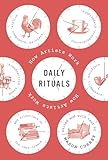I staggered through some big, challenging books this year, but when The Millions asked for a single title, the first that came to mind was a little red confection called Daily Rituals: How Artists Work, edited by Mason Currey.
 Daily Rituals describes how 161 painters, composers, novelists, and playwrights managed their hours. It’s basically a little encyclopedia; there’s no arc to it, no modulation, and it’d probably be dismal to read all at once. But for the month it waited on my nightstand, I found myself looking very forward to reading a few pages each evening.
Daily Rituals describes how 161 painters, composers, novelists, and playwrights managed their hours. It’s basically a little encyclopedia; there’s no arc to it, no modulation, and it’d probably be dismal to read all at once. But for the month it waited on my nightstand, I found myself looking very forward to reading a few pages each evening.
Among other things, I learned that: W.H. Auden munched amphetamines, Igor Stravinsky did headstands to “clear the brain,” Louis Armstrong swore by herbal laxatives, Ludwig van Beethoven took prodigious baths, Carson McCullers sneaked sherry into the local library where she wrote, Truman Capote was so superstitious he “couldn’t allow three cigarette butts in the same ashtray,” Marcel Proust sometimes ate only one croissant all day long, and John Cheever was a seriously horny person.
Also: Once, for a week straight, an insomnia-stricken Franz Kafka “saw nothing but Montenegrins in [his] sleep, in extremely disagreeable clarity.”
In other words, Currey presents 234 pages of trivia. But Daily Rituals presents more than a compendium of cocktail party ephemera. As its little thumbnails stacked up, a singular lesson emerged, one that for some reason I’ve had to relearn over and over again:
All serious artists, no matter how they work — whether at dawn or midnight, whether indoors or out, clothed or naked, intoxicated or sober — share one trait. They work.
Here’s Chuck Close: “Inspiration is for amateurs. The rest of us just show up and get to work.”
Here’s Henri Matisse: “For over fifty years I have not stopped working for an instant.”
Here’s Gustav Mahler: “You know that all I desire and demand of life is to feel an urge to work!”
Here’s Stephen Jay Gould: “I work every day. I work weekends. I work nights…”
Here’s Sigmund Freud: “I cannot imagine life without work as really comfortable.”
Here’s H.L. Mencken: “Looking back over a life of hard work…my only regret is that I didn’t work even harder.”
Here’s my 10-year-old son, Owen, last week, as he stared grim-faced at another math worksheet. “I got them all wrong! I hate long division. I wish there were superpowers. I wish I didn’t have to work.”
Alas, I wanted to tell Owen, there are no superpowers, and nothing has ever been created without work. Uncharacteristically, I kept my mouth shut, and he soldiered through his homework, night after night, and a week later I watched him finish another worksheet and look up. “I got them all right,” he said.
Here’s wishing you all a productive 2015.
More from A Year in Reading 2014
Don’t miss: A Year in Reading 2013, 2012, 2011, 2010, 2009, 2008, 2007, 2006, 2005
The good stuff: The Millions’ Notable articles
The motherlode: The Millions’ Books and Reviews
Like what you see? Learn about 5 insanely easy ways to Support The Millions, and follow The Millions on Twitter, Facebook, Tumblr.









